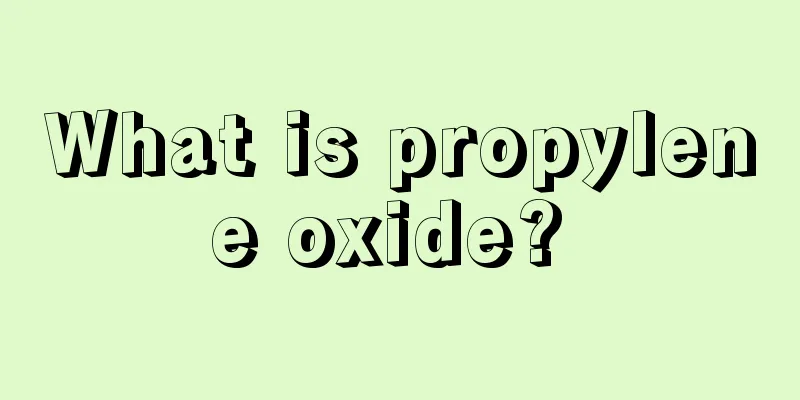What is propylene oxide?

|
In modern life, people's productivity has expanded rapidly, and many new things have emerged, which are very beneficial to people's production and life. For example, propylene oxide is a common industrial raw material, but this substance is generally used in large-scale industrial production, and it has certain irritation and is harmful to the human body, so it is difficult for ordinary people to see it. Let’s take a look at what propylene oxide is. Propylene oxide, also known as propylene oxide and methyl ethylene oxide, is a very important raw material of organic compounds and the third largest propylene derivative after polypropylene and acrylonitrile. Propylene oxide is a colorless ether-smelling liquid with a low boiling point and is flammable. It is chiral, and the industrial product is generally a racemic mixture of two enantiomers. Partially miscible with water, miscible with ethanol and ether. It forms binary azeotropic mixtures with pentane, pentene, cyclopentane, cyclopentene and dichloromethane. It is toxic and irritating to mucous membranes and skin. It can damage the cornea and conjunctiva, cause respiratory pain, skin burns and swelling, and even tissue necrosis. use: Propylene oxide (PO) is the third largest propylene derivative after polypropylene and acrylonitrile. It is an important basic organic chemical synthesis raw material and is mainly used in the production of polyethers, propylene glycol, etc. It is also the main raw material for the fourth-generation detergent non-ionic surfactant, oil field demulsifier, pesticide emulsifier, etc. Propylene oxide derivatives are widely used in industries such as automobiles, construction, food, tobacco, medicine and cosmetics. Nearly 100 downstream products have been produced, which are important raw materials for fine chemical products. Safety and toxicity: Propylene oxide products are flammable and should be stored in a ventilated, dry, low-temperature (below 25°C) and cool place. They should not be exposed directly to sunlight and should be isolated from fire sources. Propylene oxide is toxic. Liquid propylene oxide can cause burns to the skin and cornea. Its vapor is irritating and has a mild anesthetic effect. Prolonged inhalation of propylene oxide vapor can cause symptoms such as nausea, vomiting, headache, dizziness and diarrhea. All personnel who come into contact with propylene oxide should wear prescribed protective equipment, and the workplace should comply with national safety and environmental regulations. Propylene oxide is a flammable and explosive chemical and its vapors will decompose. Avoid handling and storing propylene oxide with metals such as copper, silver, and magnesium. Excessive contamination of propylene oxide by acidic salts (such as tin chloride, zinc chloride), alkalis, tertiary amines, etc. should also be avoided. Propylene oxide fires should be extinguished with special foam liquid. |
<<: Chloasma on the back of the hand
>>: What should I do if my forehead is not full and sunken?
Recommend
What causes nasopharyngeal cancer and how to prevent it
What causes nasopharyngeal cancer? How to prevent...
How to effectively treat chronic rheumatism?
Old rheumatism is not rheumatism in the elderly, ...
Can I eat fish if I have pelvic inflammatory disease
Pelvic inflammatory disease has become a disease ...
Which element promotes bone growth?
Nowadays, tall, rich and handsome men and tall, r...
How should lung cancer patients eat? Lung cancer patients should eat like this
When it comes to lung cancer, its high mortality ...
Symptoms of dysentery
There are many common problems in life, and when ...
What to do if the nails grow into the flesh after being cut
It is very common in daily life for nails to grow...
What is the reason for acne on the neck? Do you know?
Many people don’t like acne, but acne likes to gr...
What are the teeth next to the canine called
There are approximately 28 to 32 teeth in the hum...
What are the symptoms of breast cancer recurrence?
Tumor metastasis after breast cancer surgery gene...
Is nephrotic syndrome serious? What are the symptoms?
Kidney disease is a disease with a high incidence...
How to relieve itchy scars from wounds
Many people must have heard of an advertising slo...
What are the main causes of renal hamartoma
Renal hamartoma is a type of lipoma located on th...
How much water should be used to brew Da Hong Pao
Many people have the habit of drinking tea. Dahon...
What are the items in the surgical examination for pituitary tumors
What items are included in the surgical examinati...









